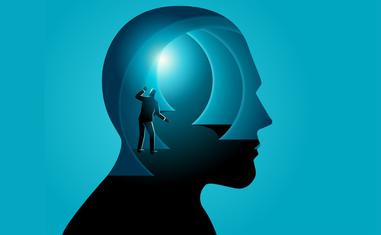The views expressed in our content reflect individual perspectives and do not represent the authoritative views of the Baha'i Faith.
If you were to ask 100 people whether they think mental health is important, it’s hard to imagine any of them saying “Nah, not really.”
But if you asked those same people, “So what exactly is ‘the mind’ that needs to be healthy?” I wonder how many would have a clear answer.
Why is that?
Well, it may be because the definition of the human mind has been the source of protracted, complicated, and passionate debate since the 5th century BCE, when Hippocrates postulated that mental illness was caused by “evil humors.” Unfortunately, the debate continues today.
RELATED: Responding to Stress with Spirituality
I am a clinical forensic psychologist with over 35 years of experience, both treating folks in psychotherapy and evaluating those who have committed crimes in which mental illness played a role. Working in that discipline this long, having to give “expert testimony” in court, I have often been frustrated by the contradictions and conflicts within my own field. Of course, while doing counseling, I have empathized with many of my clients who have recounted their struggles, not only with mental illness itself, but with the difficulty of finding the right help.
The mental health professions of psychiatry, psychology, and the cognitive sciences are, in the words of Thomas Kuhn, “immature” – meaning that no single definition of mind has been accepted by the general social science community. Different schools of thought define it differently.
Kuhn, who wrote the classic The Structure of Scientific Revolutions, explained that before a common paradigm is accepted within any scientific community, “competing schools (of thought) question each other’s aims and standards … and constantly … re-examine its first principles.”
In the mental health field, this immaturity has slowed progress and caused confusion, which leaves the door open for non-science-based explanations and attributions. Through the years, mental illness has been attributed to witchcraft, divine retribution, poor morals, and even a wandering uterus (that’s my favorite – although I know this is no laughing matter).
Even now, folks suffering from mental illness are often stigmatized, ostracized from society, or defined as criminals and arrested or worse. At times, those needing long-term care have been turned out on the street, too often leading to homelessness and eventual repeated arrests and incarcerations. More than half of incarcerated people have been diagnosed with a mental disorder – and while confined, the majority do not get the treatment they need.
The Baha’i teachings recognize the need for a new path toward understanding and treating mental illness. The Guardian of the Baha’i Faith, Shoghi Effendi, in a 1948 letter written on his behalf, acknowledged the immature state of scientific knowledge regarding the human mind:
It is a great pity that as yet so little is really known of the mind, its workings and the illness that afflict it, no doubt, as the world becomes more spiritually minded and scientists understand the true nature of man, more humane and permanent cures for mental diseases will be found.
What we know now about mental illness and addictions is that they have multiple causes and present in various ways in different people. Genetics, biology including medical issues, relationships, physical and emotional trauma, culture, societal factors like poverty and prejudice, and environmental toxins, among other factors, can and do contribute to the problems that currently fall under the broad labels of mental illness and addictions.
RELATED: Losing the Stigma: May is Mental Health Awareness Month
We know, as well, that stress plays a key role and can trigger symptoms. For example, during the pandemic, rates of anxiety and depression spiked more than 25 percent compared to pre-pandemic rates.
The Baha’i perspective is clear. Mental illness does not occur as the result of any spiritual defect or lack of spiritual progress or effort. A 1994 letter written on behalf of the Universal House of Justice to an individual, responding to an inquiry about the relationship between mental health issues and spiritual life, said: “The statement that ’only the spiritually ill experience psychiatric disorders’ is entirely without foundation.”
In fact, one of the foundational principles of the Baha’i teachings is the necessary agreement between science and religion. In a speech he gave in Philadelphia in 1912, Abdu’l-Baha said:
God has endowed man with intelligence and reason whereby he is required to determine the verity of questions and propositions. If religious beliefs and opinions are found contrary to the standards of science they are mere superstitions and imaginations; for the antithesis of knowledge is ignorance, and the child of ignorance is superstition. Unquestionably there must be agreement between true religion and science. If a question be found contrary to reason, faith and belief in it are impossible.
In keeping with this stance, the Baha’i writings repeatedly exhort individuals to get the best help available when they are ill – while leaving individuals free to decide what kind of help meets their needs. A 1957 letter to an individual Baha’i written on behalf of Shoghi Effendi gave this advice:
In the Baha’i Teachings it is made quite clear that when one is ill, one should seek the best available medical advice. This naturally leaves a person free to choose what they consider good in medical opinion.
Many people need help. According to the National Alliance on Mental Illness (NAMI) one in five American adults experiences some form of mental illness in any given year. Across the population, one in every 20 adults lives with a serious mental health condition such as schizophrenia, bipolar disorder, or long-term recurring major depression. Only about 60% of those who need help are in treatment.
These illnesses can lead to suicide, which affects people of all ages as one of the leading causes of death. According to the U.S. Centers for Disease Control (CDC), suicide rates increased approximately 36% between 2000–2021, and were responsible for 48,183 deaths in 2021, which is about one death every 11 minutes.
Getting help is often not easy. The immaturity of the mental health field and its competing paradigms and approaches make it harder. Folks wonder where to start – the family doctor? A therapist? A psychiatrist? A hospital? Should I tell a friend or family member? Should I call a help line? Should I call my insurance company to find practitioners? Should I get help on-line through tele-health? Should I tell my employer and get employee assistance?
The answer is “yes” to any or all of these. The important thing is to start somewhere and realize the journey may involve multiple practitioners from multiple fields. It may take time – many months, sometimes years – to get the right combination of treatment modalities and supports in place.
Some people avoid treatment because they fear “getting hooked on medication” for problems like depression. One would never have these same fears if the problem were labeled “medical” like diabetes or a heart condition.
The key is not to hide or deny the problems – but to get help as soon as possible. It is important to start somewhere and not remain isolated and alone. It is also important to stick with treatment once you start and to remain open to a wide variety of treatment modalities occurring simultaneously. This will increase the speed and efficacy of recovery. Prayer and the support of your faith community can help.
RELATED: How Can I Actually Feel Hopeful in the Face of Adversity?
Through the years, working with folks with mental health problems, I have heard them say they feel hopeless. Some feel even God has abandoned them because their distress is so great and help is so hard to find.
Yes, that is how it can be. I am very, very sorry to say that this journey can be terribly difficult. But these moments of greatest despair can be an ironic blessing. These can be the times when those most important first steps are finally taken. The “bottom” is often where denial and pretending break down, and the need to reach out for help becomes undeniable. Prayer, including this Baha’i prayer from Abdu’l-Baha, can help sustain the search for what we need:
O Thou who art turning thy face towards God! Close thine eyes to all things else, and open them to the realm of the All-Glorious. Ask whatsoever thou wishest of Him alone; seek whatsoever thou seekest from Him alone. With a look He granteth a hundred thousand hopes, with a glance He healeth a hundred thousand incurable ills, with a nod He layeth balm on every wound, with a glimpse He freeth the hearts from the shackles of grief. He doeth as He doeth, and what recourse have we? He carrieth out His Will, He ordaineth what He pleaseth. Then better for thee to bow down thy head in submission, and put thy trust in the All-Merciful Lord.
If you or someone you know experiences a mental health issue, please don’t ignore it or put off seeking care – early intervention is one of the very best tools available. Don’t get trapped in those old ideas that stigmatize certain kinds of problems as unacceptable. Just reach out to one of the caring professionals who specialize in the field. In the U.S., anyone can start by calling 988, the National Suicide and Crisis Lifeline – they’re compassionate, knowledgeable, and ready to help.

















Comments
Sign in or create an account
Continue with Facebookor